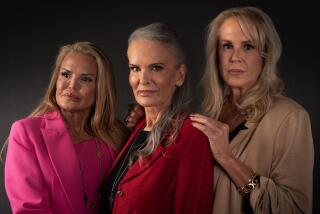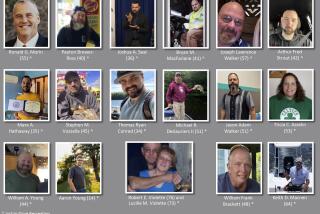From a Shattered Family: ‘Don’t Think It Won’t Happen to You’
- Share via
PORT ARTHUR, Australia — Nicole Burgess has been gone 16 months now. And how her parents, John and Sue, miss their girl who, even at 17, wouldn’t go to sleep without a kiss from Dad.
And how they wish Nicole wasn’t a symbol, instead of just a winsome teenager who loved horses and adored her kid sister. Instead, Nicole’s life or, more precisely, her death helped bring a revolutionary change in Australia’s gun law.
Nicole Burgess was one of 35 people who lost their lives in a spray of assault weapon bullets. And, in ways ordinary and profound, her parents have lost theirs too.
On April 28, 1996, Nicole was in the worst possible place--behind the counter at the Broad Arrow Cafe at the Port Arthur historical site in Tasmania, where gunman Martin Bryant opened fire with an American-made assault rifle. On that day, Bryant transformed the site--where tourists flocked to see the remains of a 19th century prison--into a place of haunting memories and grief for scores of families.
If it wasn’t horrible enough to lose their firstborn, the Burgesses were stunned to learn that the powerful weapon Bryant wielded was legal and that Tasmania--one of six states in Australia--had the most lenient gun laws in the nation.
“There is a place for some weapons,” Sue says. “There are so many good people in the world who own guns. But there is no place in society for guns like these, for human-killing weapons. . . .
“How we wish we weren’t sitting here saying this.”
Seated just a few feet from where Nicole’s name is inscribed on a simple wooden memorial on the pristine shores of the Tasman Sea, the soft-spoken couple remembers feeling some consolation when, just two weeks after the massacre, Prime Minister John Howard and the Australian government announced an all-out ban on assault weapons. The novel law, unlike American laws on assault weapons, was unequivocal: With precious few exceptions, no more assault weapons. Period.
“They say, ‘Out of the darkness comes light,’ ” Sue says. “Hopefully, it will make it better for someone else.”
For the Burgess family, the toll has been devastating.
Danielle, 13, their only other child, began losing clumps of hair after Nicole’s death. Danielle adopted Nicole’s room--just as Nicole left it--as her own.
“We asked her one day,” her mother says, “ ‘Do you think the time will ever come when you’ll want to go back to your own bed?’ And she said, ‘No.’ I asked her, ‘Why, darling?’ And she said, ‘I’m closer to Nicole here. She’s here.’
“We just wept that day.”
John frequently makes his way to the remains of the Broad Arrow Cafe, to the spot where he arrived that afternoon after hearing about the shooting on the radio. There, he cradled Nicole in her last moments. He goes there, he says, because it’s the last place he saw her alive and ‘it’s very special.”
“I don’t know how to explain it,” he says, his voice cracking.
Sue, who also was working at the Port Arthur historical site that afternoon but somehow escaped being shot, has yet to return to her job there.
“It’s the emptiness,” she says, “that’s hardest.”
She pauses to gather her thoughts and adds: “We’re not anti-gun lobbyists. But our message to the people of California, or anywhere in the world, is don’t think it won’t happen to you, because it very well could--unless someone has the vision and the strength to go out there and say, ‘No more, no more.’ ”
More to Read
Sign up for Essential California
The most important California stories and recommendations in your inbox every morning.
You may occasionally receive promotional content from the Los Angeles Times.













